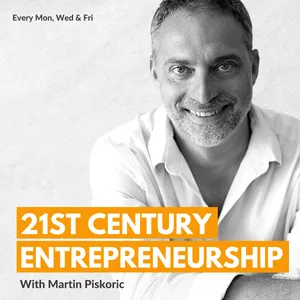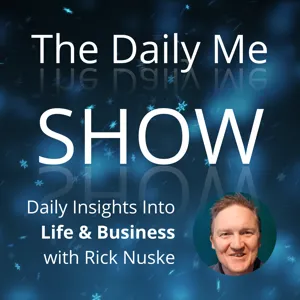Podcast Summary
Panasonic's pricing strategy and the decoy effect: The decoy effect occurs when consumers struggle to compare products and ultimately make a decision based on the relative value of each option. HubSpot's Service Hub helps businesses overcome this challenge by providing an AI-powered platform for personalized service and customer connection.
The introduction of a decoy product can significantly impact consumer behavior and decision-making. This concept, known as the decoy effect, was exemplified in Panasonic's 1992 pricing strategy. By adding a premium priced microwave oven, Panasonic disrupted the perceived value of the mid-priced option, causing sales to surge. The decoy effect occurs when consumers struggle to compare the benefits, features, and prices of multiple products and ultimately make a decision based on the relative value of each option. HubSpot's new Service Hub offers a solution to this challenge by providing an AI-powered platform that helps businesses better connect with customers, anticipate their needs, and deliver personalized service. By leveraging technology, businesses can overcome the cognitive burden of managing customer information and deliver a better customer experience at every stage of the journey.
The Goldilocks effect and our choice process: The Goldilocks effect influences our decision-making by making us more likely to choose an average option as the number of choices increases, encouraging companies to strategically design their offerings.
Our decision-making process is influenced by the number and range of options available to us. The Goldilocks effect, a related concept to the decoy effect, explains how adding more options to a choice set can change our evaluation process. For instance, if you're selling three types of beer, people tend to gravitate towards the middle option instead of making direct comparisons between the extremes. This tendency to choose the average option becomes more pronounced as the number of options increases. Companies intentionally design their offerings with this effect in mind, providing consumers with a range of choices, from economy to premium, to encourage spending. The Goldilocks effect is prevalent in various industries and product categories, from air travel to food. The science behind this effect lies in the cognitive load and complexity of making multiple comparisons. Understanding the Goldilocks effect can help businesses optimize their offerings and consumers make informed decisions.
Decoy Effect: Influencing Consumer Choices with Comparable Decoys: The decoy effect is a pricing strategy that positions a less desirable, but comparably priced option to influence consumers to purchase a more expensive product, making it seem like a better value.
The decoy effect is a psychological pricing strategy that can influence consumers to purchase a more expensive product by introducing a less desirable, but comparably priced option. This effect works by positioning the more expensive product as a better value in comparison to the decoy. For instance, in the context of tortilla chips, a consumer might compare the own brand chips with Doritos and find them equally appealing, but when Doritos' dust flavor is introduced as a cheaper alternative, sales of the supermarket brand may shift towards Doritos due to the decoy effect. This effect is different from the Goldilocks effect, where consumers are attracted to the middle option due to its perceived value between two extremes. A well-known example of the decoy effect is The Economist's subscription pricing strategy, where the introduction of a print-only subscription option influenced a significant portion of sales towards the print and online subscription. This pricing strategy has been in use for over a decade and continues to be effective today. The decoy effect works by positioning the decoy as an inferior but comparably priced option, which can make the more expensive product seem like a better value. This strategy can be effective in various industries and markets, making it a valuable tool for businesses looking to influence consumer purchasing decisions.
Using hyperbolic discounting to increase prices: Businesses can boost prices by leveraging consumers' focus on the present and deferring pain, through tactics like temporary price freezes or gradual increases with immediate benefits. The decoy effect may also aid in price hikes.
Businesses can effectively increase their prices by utilizing the concept of hyperbolic discounting, which takes advantage of people's tendency to focus on the present and defer pain. This can be done by offering a temporary price freeze or a gradual price increase with an immediate benefit. The decoy effect, which can make consumers insensitive to price changes, may also contribute to the success of this pricing strategy. For instance, economists have been using this tactic for over a decade, and firms like EA offer free trials or discounted monthly payments to encourage consumers to commit to higher prices in the future. However, it's important to note that while this strategy can be effective, it may not work for all businesses or consumers, and it's crucial to consider the long-term implications of such pricing strategies.
Influencing Consumer Behavior with Hyperbolic Discounting and the Power of Free: Businesses leverage human tendencies, such as valuing immediate rewards and being swayed by free items, to encourage purchases. Hyperbolic discounting and the power of free are effective strategies for subscription models and multi-tier pricing.
Businesses use various tactics, such as hyperbolic discounting and the power of free, to influence consumer behavior and encourage purchases. Hyperbolic discounting refers to the human tendency to value immediate rewards more than future benefits, which can be advantageous for companies offering subscription models. The power of free is another effective strategy. Free items lower our critical faculties and act as attention-grabbers, making consumers more likely to want the product, even if it comes with hidden costs. This strategy is often used in multi-tier pricing, where businesses cater to different customer segments by offering various product tiers with varying prices and features. A notable example is Amazon Prime, which gained significant success by offering free shipping and additional perks, making consumers feel they were getting a great deal, even though the costs were hidden in the subscription fee. However, this strategy did not work in France, where Amazon charged a small fee for delivery, demonstrating the importance of understanding cultural differences and consumer preferences.
The impact of small pricing changes on sales: Small adjustments to pricing and offers can significantly influence sales. Decoy effect, hyperbolic discounting, and freebies are effective tactics to consider.
Small changes in pricing and offers can have a significant impact on sales. For instance, the removal of a 1 cent fee on Amazon France led to a noticeable increase in sales. This phenomenon is known as the decoy effect, where offering an additional, less attractive option can make the preferred option seem more appealing. Another tactic is hyperbolic discounting, which can make a price increase less painful by emphasizing the immediate benefits of the offer. Additionally, the power of free cannot be underestimated, as freebies can encourage customers to make a purchase. In the previous episode, we explored other pricing strategies such as anchoring, charm pricing, and product positioning. Lee, our guest, provided valuable insights on these topics. Don't forget to sign up for the mailing list to be notified of new episodes and to be entered into a contest to win a copy of Lee's book. Stay tuned for next week's episode, where one lucky subscriber will receive a free copy.





